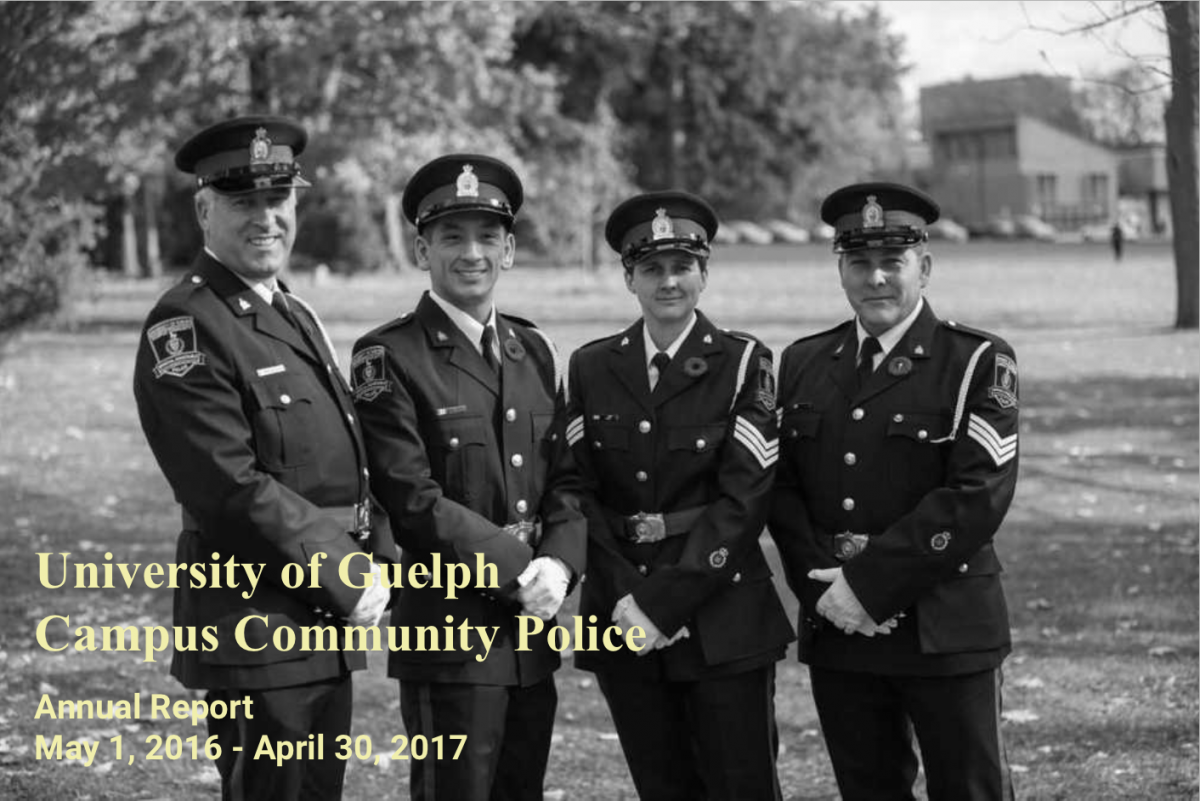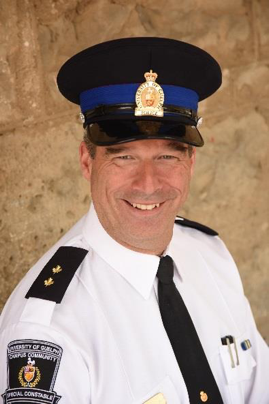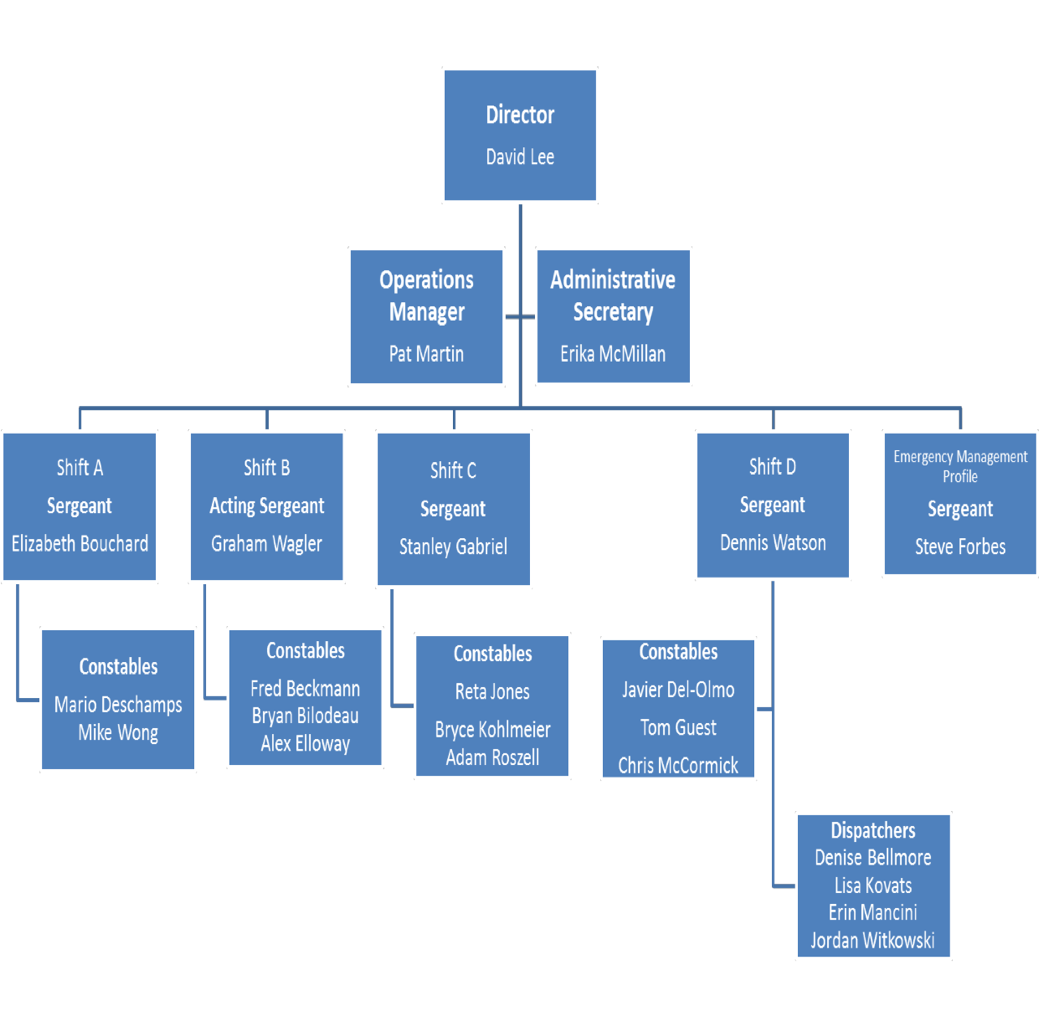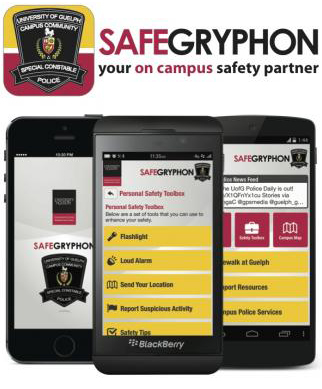2016-2017 Campus Community Police Annual Report

Table of Contents
- Introduction
- Our Partnership with Guelph Police Service
- Message from the Director
- Who Are We
- Our Staff
- Recruitment and Hiring
- Organizational Chart
- Accomplishments and Community Initiatives
- Training and Conferences
- Statistics

Introduction
Our Mission Statement: Our mission is to serve and support the academic and campus community and provide a safe campus environment for our students, faculty, staff, and visitors. We accomplish this through working in partnership with the campus community in seeking and developing solutions to build on and enhance all of the services we provide, while respecting the dignity and individuality of each person we interact with.
The University of Guelph main campus continues to be a vibrant and growing community. The campus is active 24 hours, 7 days a week with a daily population of approximately 30,000 students, staff and visitors. At night, approximately 5,000 students in residence and family housing units call the campus home. The “transit loop” located at the University of Guelph has approximately 800 buses per day and 2.3 million people per year travel through this transit hub.
The University of Guelph Campus Community Police (CCP) receive their regulatory authority through the Guelph Police Services Board as approved by the Ministry of Community Safety and Correctional Services. As a true member of the university community, CCP works cooperatively with our stakeholders and partners to identify, address and implement solutions and services to enhance safety for our diverse community.

Our Partnership with Guelph Police Service

The University of Guelph and the Campus Community Police continue to enjoy a positive working relationship with the Guelph Police Service.
Members of the Campus Community Police are designated as Special Constables as authorized by the Guelph Police Services Board and approved by the Ministry of Community Safety and Correctional Services. This appointment confers specified powers of a police officer, to the extent and for the specific purpose set out in the appointment and are restricted to a specific jurisdiction. The appointments are renewed every five years. Further, an Agreement between the Guelph Police Services Board and the University of Guelph governs the roles and responsibilities of both the Campus Community Police and the Guelph Police Service. The Agreement defines and enhances the strong working relationship between the two services.
Our partnership with Guelph Police includes the provision of training, oversight and mentorship to the staff of CCP. The staff from both services works jointly to identify and resolve issues common to both departments. Although CCP is not directly involved in the front-line policing activities of the Guelph Police, we continue to offer our experience and knowledge in student life and conduct to Chief Deruyter and his team to support creative initiatives in these areas.

Message From the Director
 I would like to thank all members of Guelph Police Service for their support and assistance in this last year. I look forward to building upon our symbiotic partnership, and to contribute towards the safety and security of the university’s and the city’s community.
I would like to thank all members of Guelph Police Service for their support and assistance in this last year. I look forward to building upon our symbiotic partnership, and to contribute towards the safety and security of the university’s and the city’s community.
Dave Lee, Director
Campus Community Police, Fire Safety & Emergency Management

Who We Are
The University of Guelph Campus Community Police Service is a department of highly trained special constables and dispatchers who are responsible for the safety and security of the Guelph campus. We also act as a resource for the University’s regional campus in Ridgetown.
Our office is located in the Trent Building on Trent Lane. Members of the CCP are on campus 24 hours a day, 365 days a year, providing community-based policing through foot, cruiser and bicycle patrols to ensure that a safe environment is maintained for those who study, work, visit and live at the university.
Contact us or follow us on social media at:

Our Staff (as of September 2016)
The Campus Community Police now has a total staff of sixteen sworn officers providing service 24 hours a day, 7 days a week. There are four civilian dispatchers (plus our part-time dispatch team) and fourteen sworn Special Constables interacting with and responding to calls on campus.
| Team Member | Position |
|---|---|
| Dave Lee | Director |
| Garry Male | Manager, Operations & Fire Safety |
| Dave Pringle | Emergency Management Coordinator |
| Sheila Gharabaghi | Administrative Secretary |
| Liz Bouchard | Sergeant |
| Larry O'Connell | Sergeant |
| Stan Gabriel | Sergeant |
| Graham Wagler | Sergeant |
| Fred Beckmann | Special Constable |
| Bryan Beckmann | Special Constable |
| Javier Del-Olmo | Special Constable |
| Mario Deschamps | Special Constable |
| Alex Elloway | Special Constable |
| Tom Guest | Special Constable |
| Reta Jones | Special Constable |
| Bryce Kohlmeier | Special Constable |
| Chris McCormick | Special Constable |
| Mike Wong | Special Constable |
| Erin Mancini | Special Constable |
| Denise Bellmore | Dispatcher |
| Gillian Douglas | Dispatcher |
| Lora Halliburton | Dispatcher |
| Jeanette Bransfield | Dispatcher |

Recruitment and Hiring
During this reporting period, four new Special Constables were hired. Tom Guest and Michael Wong were appointed in June 2016, Bryan Bilodeau and Margaret (Reta) Jones in October 2016. Lindsay Winger from Student Housing was seconded from September 2016 to January 2017 as the Manager, Communications and Administrative Service.

Organizational Chart


Accomplishments and Community Initiatives
“SAFEGryphon” is a Safety App for smartphones that is available for our entire campus and external community, as another tool provided by Campus Community Police in an effort to improve safety on campus. Smartphone technology is the most common method of communication and the SAFEGryphon App allows CCP to share key information with others in a quick and efficient manner. We are continually encouraging all of our campus community, students, parents, faculty and staff to download the App.

Our team of dedicated officers make a conscious effort to create an atmosphere in which members of the university community actively engage with us. CCP takes the lead role for law enforcement and physical security for our community.
Through a diverse variety of partnerships, participation on committees and presentations, we provide education and act as a resource both on and off campus. In this reporting period, Campus Police initiated 39 Community Policing events, engaging stakeholders and the community that were above and beyond their regular patrol duties. Over the past year these activities included attendance at Residence meetings, Stop Tag programs for departments, Bicycle SPACE Program, meeting 1st year students in residence, meeting 1st year International students and orientation, Residence Life staff training, Family Housing bike rodeo, Push for Change fundraising, involvement in the Library’s Exam Stress Busters program, Coffee with a cop meet and greets, Local Remembrance Day parades, attendance at the Canadian Police and Peace Officers Memorial in Ottawa.
This past year CCP were active with programs like the Rape Aggression Defence System (RAD). Sexual Violence Advisory Committee, Crime Prevention Through Environmental Design (CPTED) audits, Workplace Harassment and Violence, Mental Health Strategy, the STOP program and the Officer in Residence Program.
CCP is in the process of implementing a number of recommendations that were put forward in the 2014 review of Campus Community Police by Impact Security Associates Inc. of London. Director Dave Lee has been continuously evaluating the implemented recommendations in addition to our delivery of services since September 2015.

Training and Conferences
In partnership with the Training Branch of the Guelph Police Service, Ontario Association of College and University Security Administrators (OACUSA) and International Association of Campus Law Enforcement Administrators (IACLEA), we continue to explore opportunities for training and professional development for the department. Training is also provided by the Canadian Police Knowledge Network (CPKN) and the Ontario Police Video Training Alliance (OPVTA) through our Portal with CPKN.
In compliance with our agreement with the Guelph Police Services Board, all officers completed the mandatory First Aid/CPR and the Use of Force training. The table below provides some examples of the wide variety of professional development undertaken by the members of the Campus Police in 2016-2017 in addition to mandatory requalification courses.
| Course | Given by | Attendees |
|---|---|---|
| Smile (Social media) Conference | Long Beach Police Department | 2 |
| IACLEA | IACLEA | 1 |
| Human Trafficking Community Mobilization | Victim Services Wellington | 1 |
| Crime Prevention through Environmental Design (CPTED) | Ryerson University | 2 |
| Disaster Management Conference | Diversified Communications | 1 |
| OCUSA Conference | OCUSA | 3 |
| Special Constable Course | University of Waterloo | 3 |
| Women’s Leadership Institute | International Association of Chiefs of Police | 1 |
| Anti-Terrorism and Active Shooter Conference | Niagara Regional Police & OPP | 2 |
Statistics
The following chart outlines the reportable incidents statistics for the 2015-2016 year.
| Type of Incident | 2014-2015 | 2015-2016 | 2016-2017 |
|---|---|---|---|
| Alcohol Offence* | - | 47 | 83 |
| Arson / Intentional Fires | 0 | 0 | 0 |
| Bomb Threats | 0 | 0 | 0 |
| Break and Enter | 1 | 10 | 12 |
| Disturbances | 0 | 1 | 10 |
| Domestic Disturbances | 12 | 7 | 5 |
| Drugs * | - | 134 | 141 |
| Frauds and Counterfeit Money | 15 | 5 | 11 |
| Harassment | 2 | 13 | 14 |
| Hate Crimes | 0 | 0 | 0 |
| Hate Activity | 17 | 14 | 12 |
| Homicide | 0 | 0 | 0 |
| Impaired Driving | 1 | 1 | 0 |
| Mischief/Vandalism/Property Damage | 139 | 115 | 92 |
| Obscene/Nuisance Calls | 1 | 0 | 0 |
| Sexual Violence ** | 1 | 8 | 14 |
| Sudden Deaths | 0 | 0 | 2 |
| Threatening | 2 | 1 | 2 |
Theft/Possession of Stolen Property
| Type of Incident | 2014-2015 | 2015-2016 | 2016-2017 |
|---|---|---|---|
| Automobile | 6 | 6 | 9 |
| Bicycles | 25 | 71 | 39 |
| All other thefts | 101 | 74 | 82 |
Assaults
| Type of Incident | 2014-2015 | 2015-2016 | 2016-2017 |
|---|---|---|---|
| Peace Officer | 0 | 1 | 0 |
| All other | 7 | 2 | 8 |
Mental Health
| Type of Incident | 2014-2015 | 2015-2016 | 2016-2017 |
|---|---|---|---|
| All | 33 | 39 | 61 |
| Sudden Deaths | 0 | 0 | 2 |
*New reporting category
**Sexual Violence includes incidents of sexual assault, sexual harassment, stalking, indecent exposure, voyeurism and sexual exploitation (Ref. Bill 132).
Campus Police continue to track incidents on campus to assist in determining training needs, education, outreach and strategies for effective mobilization of resources. We also share this information with our community during the academic year through a weekly incident report that is posted on our social media sites.
In this reporting period (May 1, 2016-April 30, 2017), the Campus Police responded to 5903 calls for service compared to 5098 last year ( + 15.8% ), resulting in 1564 Incident Reports being completed by the officers compared to 1371 last year ( +13.9% ).
The number of reported Sexual Violence incidents increased this year. This may be the result of greater awareness and education around sexual violence, an expanded definition of sexual violence (previously captured only sexual assaults) and increased training with respect to how the University responds to these types of incidents. Campus Community Police will continue to provide their expertise and knowledge around this topic and participate in the various campus committees and initiatives.
In 2017, The University of Guelph created a Sexual Violence Policy, which is one of the student-focused initiatives that are geared towards a respectful environment and supporting and referring victims. All Campus Police officers received the Tier 1 training that was provided by the University. In addition, Campus Police attended the sexual violence and training session that was put up by the Diversity Office. Other stakeholders in the training session included Student Life and Student Housing, the end goal being various departments within the University coming together to support members of the university community.
Here 24/7 and Good2Talk are 24hr referral lines that Campus Police use after hours in addition to the various other student support initiatives that the University offers when officers attend to calls involving mental health. Calls involving mental health went up from last year and some portions of the variance increase can be attributed to an environment that is supportive and conducive to making the reporting process less difficult.
The number of bicycle thefts decreased markedly from 71 incidents reported in the 2015- 2016 year to only 39 this year. Officers, in addition to increased bicycle safety and awareness programs, such as the lock exchange program, accomplished this through targeted foot, bicycle and cruiser patrols.
The development and implementation of a new Emergency Management System has been a top priority for Director Lee. The Emergency Management Plan was updated in 2016 and various platforms and delivery systems are currently being studied to find the best fit that will serve the University’s current and future needs.